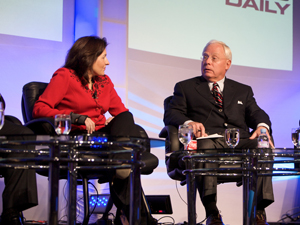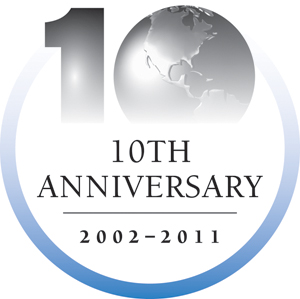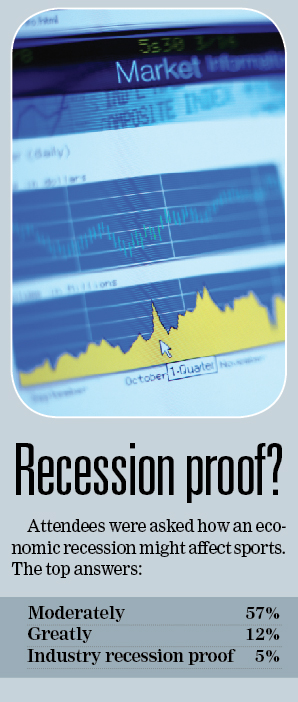 |
MICHAEL GOOD PHOTOGRAPHY
St. Regis Resort in Dana Point, Calif.
|
As guests gathered on a picture-perfect day for a reception at St. Regis Resort in Dana Point, Calif., storm clouds were gathering over the nation’s economy. Yet despite the challenges that appeared ahead, many of those in attendance thought the sports industry could weather a recession. Few, however, could have imagined just how severe that recession would become.
And beyond the economy, rumblings could be heard from the NFL, where talk shifted to the need for a new labor deal.
Bullish to the end
 |
MICHAEL GOOD PHOTOGRAPHY
Bea Perez and George Gillett discuss the outlook for the economy. |
Despite ominous signs in the economy, many panelists assured attendees that the industry remains impervious to an economic recession.
“We’re actually looking at this as a huge opportunity for us and for the industry,” said Bea Perez, Coca-Cola’s senior vice president of integrated marketing at that time. “The break sports offers from the struggles of life can really capture consumers’ attention. For us, it’s ‘don’t ease up.’ It’s ‘do it bigger, do it better, do it stronger.’”
Executives said two key sports revenue drivers outside the gate — sponsorship and advertising spending — wouldn’t slow down
due to economic weakness. Strong ticket sales at the time reinforced the commonly held belief that consumers turn to sports in hard times as a distraction.
“Traditionally, sports has been relatively inelastic, and the ups and downs of the economy haven’t had a significant effect in a consumer respect,” said MLS Commissioner Don Garber. “It’s a very bullish time in the industry.”
“I think the sponsors and their economists are much sharper than the rest of us, and this is the time they’ll really put the pedal to the metal,” said George Gillett, then owner of Liverpool FC.
Still, there was plenty of caution delivered at the event.
“I think sports is recession-resistant,” said ESPN’s John Skipper. “I prefer we get through this recession as quickly as possible, because I don’t want to see how resistant we are or aren’t.”
“The problems are coming,” said sports researcher Rich Luker. “We’re not there yet. I’d be surprised if we’re not seeing some effects [of the economy and $4 gasoline prices] beginning between July Fourth and Labor Day.”
And then-USOC Chairman Peter Ueberroth said, “Sports may get an uptick initially because it replaces something else that’s more expensive — a vacation or something else. It’s a lagger in that sense, but it’s coming, and the economy is suffering in a way that’s going to last for some time.”
Does the U.S. get it on soccer?
 |
MICHAEL GOOD PHOTOGRAPHY
Joe Roth
|
One would expect Hollywood executive
Joe Roth to be bullish on soccer. After all, he’s the majority owner of the Seattle Sounders, which were set to begin play with MLS the following year. So he had a lot to say when asked about doubts that the sport will ever be as prominent in the U.S. as it has become virtually everywhere else.
“It makes me angry because it makes us look stupid,” Roth said. “It’s not possible that we as a country are so different than everybody else. It just hasn’t been tapped in the right way.”
Differences on streaming
Boston Red Sox Chairman Tom Werner said MLB team owners were wrestling with MLBAM, baseball’s interactive arm, over control and distribution of new media.
 |
MICHAEL GOOD PHOTOGRAPHY
Tom Werner
|
“As everybody knows, there is a stalemate right now … in terms of in-market streaming,” Werner said. “In-market streaming is good for the customer. But from our point of view, it has to be done in conjunction with our RSN and our affiliates, such as Comcast and Time Warner, in such a way that the product being offered to the consumer is complementary rather than competitive with the games that are on satellite and cable.”
Werner was indeed correct that in-market streaming within MLB would not experience rapid growth, with RSNs and MLBAM still generally at odds on the topic today. Only two teams to date, the New York Yankees and San Diego Padres, now participate.
An uneasy feeling on labor
New York Giants co-owner Steve Tisch said the NFL’s labor deal made him feel “queasy.”
“We
need to see beyond it, what our options are. It’s complicated. Roger
[Goodell’s] going to have to bring everyone together with a united
front.”
NFL owners opted out of the deal early, setting the stage for the current labor battle playing out today.
It's no game
EA Sports’ Peter Moore admitted that his company’s games were becoming “too damn hard.”
He
said, “We’re going to get run over by the Wii and Guitar Hero if we’re
not careful. We have to bring the NFL to complement, and I stress the
word complement, the intellectual property so popular out there.”
EA
Sports has since broadened the scope of its game offerings
considerably. Simulation, console-based games remain the base of its
operations, but those titles have been complemented by entries into
Facebook, browser-based online gaming and the more casual Wii console.
Music
gaming, for its part, is now in significant decline and the Guitar Hero
franchise was effectively dissolved earlier this year.
He may need a doctor
When George Gillett was asked if he would remain an owner in Liverpool FC, which he co-owned at the time with Tom Hicks, Gillett offered an anecdote about a doctor who gave a speech on living a long life. The key was to choose your parents wisely.
“I would say, ‘Choose your partner wisely,’” Gillett said. He paused a few seconds and added, “He’s a great guy. He’s just got a different perspective on the media.”
New England Sports Ventures purchased Liverpool in 2010. Gillett and Hicks opposed the sale and have since filed legal challenges against the new owners.












